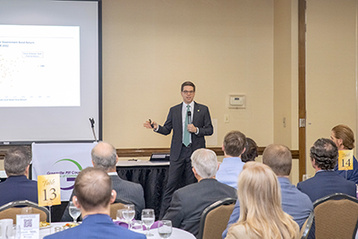By Pat Gruner, Staff Writer
The Daily Reflector
GREENVILLE, NC — An economist said there is a 60 percent chance of a recession in 2023 but North Carolina and Greenville’s labor markets likely will keep them in a good position to weather economic uncertainty.
Philip Neuhart, director of marketing and economic research for First Citizen’s Bank, presented on global, national, state and local economic trends to business owners and public sector leaders at the Holiday Inn, 203 S.E. Greenville Blvd., during the Greenville-Pitt County Chamber of Commerce’s Economic Forecast Luncheon.
The turnout was one of the largest in years, according to Trent McGee, the chamber’s president and CEO. That could be due in part to the tumultuous nature of 2022, which Neuhart noted saw a war erupt in Ukraine and seven federal interest rate hikes since March with an eighth expected this week. Neuhart said he anticipates two further rate hikes in 2023.
The Federal Reserve on Wednesday raised its key interest rate by a quarter-point, the eighth hike since March, according to the Associated Press. And the Fed signaled that even though inflation is easing, it remains high enough to require further rate hikes.
Though smaller than its previous hike — and even larger rate increases before that — the Fed’s latest move will likely further raise the costs of many consumer and business loans and the risk of a recession, the AP report said.
Neuhart said the developed world, with the exception of China, is seeing slowed economic growth. China’s growth can be attributed to its reopening he said. The slowed growth is a contributor to the possibility of a recession, he said, but added that 60 percent is not “a slam dunk” as far as certainty.
Inflation continues to be a contributing factor, both in the costs of goods and rising wages. Neuhart said that the rate of inflation is beginning to smooth out, with rates at 6.5 percent in December after peaking at 9.1 percent in June, as the nation finds itself in a position of no money growth following a year of exuberant spending. The Federal Reserve’s desired rate is 2 percent.
“We had unbelievably easy money,” Neuhart said. “If you think about some of the behaviors of 2020, 2021, meme stocks, crypto, tech space, that’s what happens when money’s easy.”
Supply chains have eased as well, according to an index Neuhart uses that cites factors to include delivery times and backlog. He said the system has not cleared out but is better than in pandemic times, which helps with inflation.
A strong indicator of recession can be seen in short-term interest rates being higher than long-term rates, Neuhart said. A 10-year projection expects both of those rates to fall, likely due to economic downturn brought on by what he expects to be a shallow recession.
People who are able to travel are a good example of those who will not be hit very hard by an economic downturn, Neuhart said, but people living paycheck to paycheck will bear the brunt.
North Carolina’s continued population growth leaves the state in a strong position, Neuhart said, as are investment numbers and labor market trends. Comparatively the state’s population is growing at a higher rate than the nation as a whole, he said.
Greenville’s rate of growth is slightly lower but the city has a particularly strong labor market compared to other parts of the region, such as Neuhart’s hometown of Rocky Mount, but he cautioned that regional data can be “bumpy” and difficult to collect.
“Not that long ago, Greenville and Rocky Mount had pretty similar per capita personal income, but Greenville has really widened the spread over the past 15 years,” Neuhart said.
The city also has two sectors, health care and education, that are typically strong in the face of economic downturn according to Neuhart. East Carolina University and ECU Health Medical Center, according to 2022 data employed 6,120 and 6,400 workers respectively.
“People still get sick during a recession,” Neuhart said.
Greenville also participated in the “incredible” rise in housing prices over the past two-three years with a downturn recently, Neuhart said.
“That’s because no local economy is immune to what is happening nationally,” Neuhart said. “Mortgage rates are higher here, too, but what we are seeing nationally is that rates are coming down, but so are home prices, at least home price appreciation.
Neuhart said inventories nationally in December were still below the pre-pandemic levels.
Forecast: Recession with chance of sunshine: Expert tells chamber crowd region can weather possible downturn

Phillip Neuhart, director of market and economic research for First Citizens Bank, addresses attendees during the Greenville-Pitt County Chamber of Commerce's Economic Forecast Luncheon on Jan. 31.
